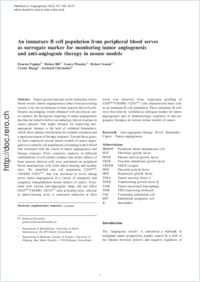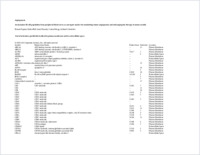An immature B cell population from peripheral blood serves as surrogate marker for monitoring tumor angiogenesis and anti-angiogenic therapy in mouse models
- Fagiani, Ernesta Department of Biomedicine, University of Basel, Switzerland
- Bill, Ruben Department of Biomedicine, University of Basel, Switzerland
- Pisarsky, Laura Department of Biomedicine, University of Basel, Switzerland
- Ivanek, Robert Department of Biomedicine, University of Basel, Switzerland
- Rüegg, Curzio Department of Medicine, Faculty of Science, University of Fribourg, Switzerland
- Christofori, Gerhard Department of Biomedicine, University of Basel, Switzerland
-
29.05.2015
Published in:
- Angiogenesis. - 2015, vol. 18, no. 3, p. 327–345
English
Tumor growth depends on the formation of new blood vessels (tumor angiogenesis) either from preexisting vessels or by the recruitment of bone marrow-derived cells. Despite encouraging results obtained with preclinical cancer models, the therapeutic targeting of tumor angiogenesis has thus far failed to deliver an enduring clinical response in cancer patients. One major obstacle for improving anti-angiogenic therapy is the lack of validated biomarkers, which allow patient stratification for suitable treatment and a rapid assessment of therapy response. Toward these goals, we have employed several mouse models of tumor angiogenesis to identify cell populations circulating in their blood that correlated with the extent of tumor angiogenesis and therapy response. Flow cytometry analyses of different combinations of cell surface markers that define subsets of bone marrow-derived cells were performed on peripheral blood mononuclear cells from tumor-bearing and healthy mice. We identified one cell population, CD45dimVEGFR1⁻CD31low, that was increased in levels during active tumor angiogenesis in a variety of transgenic and syngeneic transplantation mouse models of cancer. Treatment with various anti-angiogenic drugs did not affect CD45dimVEGFR1⁻CD31low cells in healthy mice, whereas in tumor-bearing mice, a consistent reduction in their levels was observed. Gene expression profiling of CD45dimVEGFR1⁻CD31low cells characterized these cells as an immature B cell population. These immature B cells were then directly validated as surrogate marker for tumor angiogenesis and of pharmacologic responses to anti-angiogenic therapies in various mouse models of cancer.
- Faculty
- Faculté des sciences et de médecine
- Department
- Médecine 3ème année
- Language
-
- English
- Classification
- Biological sciences
- License
- License undefined
- Identifiers
-
- RERO DOC 257287
- DOI 10.1007/s10456-015-9470-9
- Persistent URL
- https://folia.unifr.ch/unifr/documents/304530
Other files
Statistics
Document views: 97
File downloads:
- rue_icp.pdf: 156
- rue_icp_sm.pdf: 163

